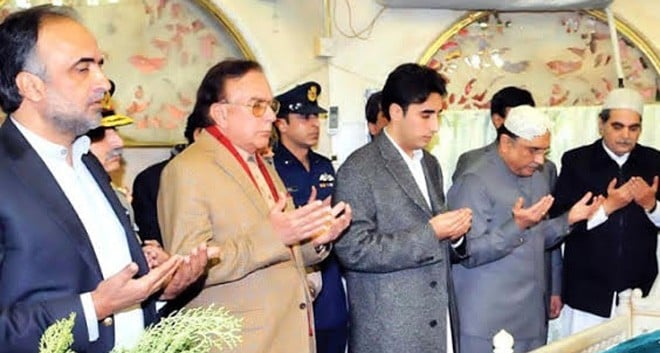
The crisis in Islamabad has let open both grievances and opportunities for the PPP in Punjab

The fight between the PTI and the PML-N, displayed in full measure in the capital’s Red Zone as well as on the television screens for about a month, contains within it the seeds of good fortunes for another party. The PPP that looked beaten, dead and buried a year ago has reemerged with a strong united face and can at least hope to do active politics for now.
That’s not how things looked like a few weeks ago.
When Imran Khan roared with confidence, while speaking to the participants of his dharna in the first week, there were whispers of a revolt in the PPP’s ranks. Some of the party’s best men in Punjab including Qamar Zaman Kaira and Nadeem Afzal Gondal would soon jump ship and join Khan’s ranks, the rumour-mongers indicated.
This was a time when the PTI’s strength, visible not as much in numbers in the capital as in the minds of urban Punjabis, and drawing room and social media discussions, convinced everyone that the PPP’s fortunes in Punjab were sealed.
The party’s support for the government at the centre did not go so well with the cadres, especially in Punjab, who have always seen the PML-N as their main adversary. Actually, the resentment has been brewing in Punjab for quite some time which became more acute in the aftermath of May 2013. Sindh seemed to be dominating the party and that’s where all major decisions are said to have been taken. This could have something to do with the fact that a PPP parliamentary party meeting was inevitably going to be dominated by Sindh since not very many people were elected from Punjab in the last election.
Some might think this province-wise distinction is more perceived than real; others would say the party’s victimhood narrative has started multiplying itself and has now come to haunt the party from within.
Whatever the explanation, this sense became more palpable when party co-chairman and former president, Asif Ali Zardari, landed in Lahore to meet Mian Nawaz Sharif and Maulana Sirajul Haq. The provincial office bearers, and that includes the provincial party head Mian Manzoor Wattoo, claimed they were not informed and came to know of his arrival through the media.
Contrast that with the united front the party has put up in the joint session of the parliament in the last week or so. Hear the speeches carefully and it seems, even if for the sake of optics, that that sense of indifference and abandonment in Punjab has been addressed. Whether it is Aitzaz Ahsan or Khursheed Shah or Raza Rabbani, they have all made it clear to the government that the party support for them is not unconditional or uncritical.
Contrasting positions have been taken and handled rather intelligently -- with Rabbani thundering about how they stood with the system after so many elections stolen from the PPP and Aitzaz narrating Neruda’s poem to almost justify and condone the dharna outside -- this was realpolitik at its best.
So does the party see the window of opportunity opened for it by the crisis?
After all, the party a year ago was not ousted just because there were bomb blasts and it was not allowed to campaign: it had serious credibility issues; the defeat owed itself not as much to delivery failure as to corruption. Today the situation has changed. With Nawaz Sharif’s political capital eroded to a considerable degree, this is the best time for the PPP to strike. Because, as one source within the party says, "as soon as Shahbaz Sharif tries to sell you a Metro Bus, you can turn back and say to him ‘But you are a murderer!’ In the past three years, this is the best time to be in PPP Punjab."
One doesn’t know about other people but the party chairman, Bilawal Bhutto Zardari (BBZ), has announced to come to Punjab in the third week of September and handle the provincial party matters. While this is the third such announcement made since February this year (it did not materialise twice before), it certainly looks like the best time for him considering the challenges the party has faced earlier on.
Did Qamar Zaman Kaira, former information minister, have second thoughts too because this was the best time to be in the PPP? He brushes all rumours aside by saying that no party can match the comfort level he enjoys in the PPP. Apart from all the posts that he has held including ministerhip, governorship, candidature of prime ministership and the senior positions in the party, he refers to the democratic culture within the party where "all opposition is accepted with tolerance".
He looks at the grievances of Punjab in a different way. In Punjab, the party has faced Muslim Leagues of all hues and therefore sees it as its rival. This is different from KP and Sindh where their adversaries have been parties other than Muslim League. "In the last 30 or more years that Muslim League has been in power in Punjab, it has targeted the PPP. The leadership has absorbed those sorrows but the worker hasn’t; the pain has seeped in generation after generation."
While that partly explains the feeling in Punjab, the fact remains that the vacuum created by the party’s absence from the field has been captured by the PTI. This may have to do with the party sticking to its agrarian past while the province has urbanised beyond recognition. "If that fact and other realities in the province are not addressed and the PPP performs similarly in one more election, it will be wiped out," says Lahore-based analyst Suhail Warraich.
People still romanticise with the idea of PPP and genuinely think that Zulfikar Ali Bhutto and Benazir Bhutto were great leaders, says Warraich. "That ideology must be preserved or it will be divided too."